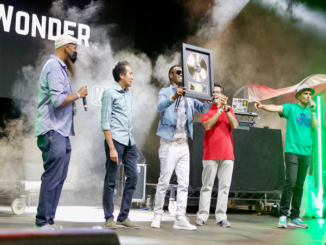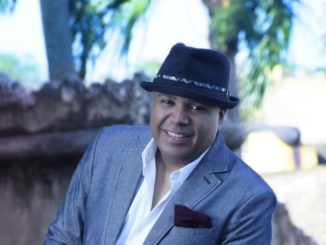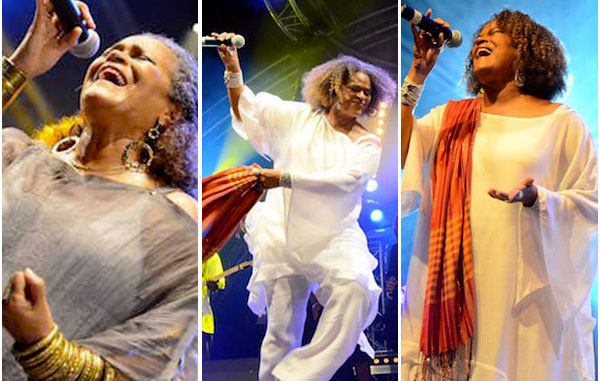
Martinican singer Jocelyne Béroard gave a long interview to kariculture.net, a few months ago. The only woman who sings in the Martinico-Guadeloupean (or vice-versa) zouk group, Kassav’, travels all over the world for more than three decades with her “music family” to represent with dignity our Caribbean region. Pride, humility and generosity guide this artist who has various gifts.
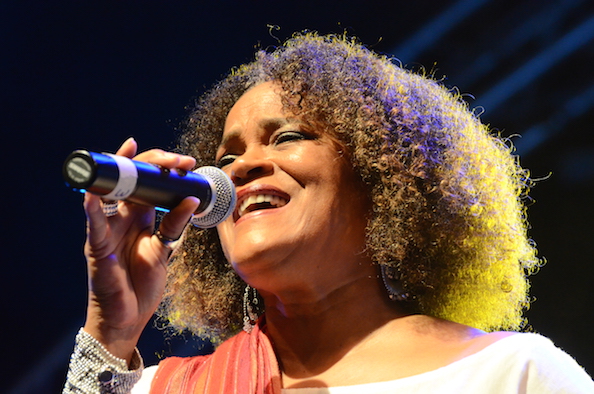 KARICULTURE.NET : It’s 35 years since you joined Kassav’, what is the secret of a so long collaboration ? The love of music?
KARICULTURE.NET : It’s 35 years since you joined Kassav’, what is the secret of a so long collaboration ? The love of music?
Jocelyne Béroard : Definitely ! In addition, I take pleasure in doing it with my friends. Kassav’ was not created conventionally, with people put together to make a band. First, it was an idea, a desire. From the experimental status, there was the need to create the group, so each of us was called one after the other. The desire to participate, the sociability and the desire to take part in the experience were important criteria to be called back to the band until the final membership. Everyone knew where he was and had the same desire to participate in the creation of this musical style.
KARICULTURE.NET : Kassav’ went down in history when it invented a musical style called Zouk, do you feel in “mission” in view of the large number of concerts that you continue giving throughout the world ?
J. B. : No, I do not think this is a mission, the only mission we have is to share this music with the public and, with our songs and our texts, perhaps to contribute, generally, to a better harmony between people. In Angola, for example, a former military commander told us that Kassav’ music helped them a lot morally during the war. To represent Guadeloupe and Martinique with dignity is also a concern. The Japanese went home because they liked our music and wanted to know the islands where it came from. But, I think it’s also a exemplary band that succeeded in getting Guadeloupeans and Martinicans together during all these years without any problem.
KARICULTURE.NET : Your concerts at the Atrium in Martinique in 2005 and at the Olympia in Paris in 2011 were a great success, what do you feel when you sing alone, without the men of Kassav’? Do you have more freedom, creativity or even more imagination?
J. B. : I like to be surrounded by my friends, but when I give a solo concert, I can play all the songs that we did not have time to offer the audience. Yes, it’s certainely, a greater freedom, but I never felt like a prisoner in Kassav’ either.
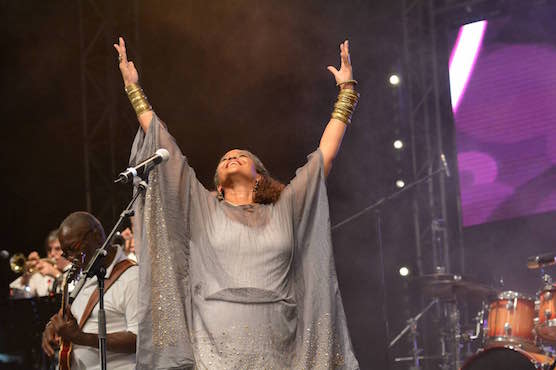
KARICULTURE.NET : After the release of your solo CD called “Siwo” in 1986, you were the first Caribbean singer to receive a Disque d’Or (Gold Disc) which crowned the sale of 100 000 records, how did you feel when you receive this award ?
J. B. : With relief because I knew what we described as “to have a lump in one’s throat”, the anguish to have failed, to displease… The men in Kassav’ have initiated the success of the band, I didn’t have to be the weak link, they were aware of that and they gave me beautiful compositions. So, I was relieved because, in this music world reserved for men, it was a real challenge.
KARICULTURE.NET : Kassav’ is “the sound machine” which is all the time on stage around the world, what are your secrets to be always on top forme ? Do you have a healthy, a strict lifestyle?
J. B. : I try to get some rest, as soon as possible, and I do not overindulge. I do not go out very much. It must be said that when we come back home, we don’t want to go too far and that allows to recharge our batteries. I eat normally but never before a concert, and I drink only water before a concert. I go walking quite regularly and I get a massage, as soon as possible
KARICULTURE.NET : You participated in three films with Caribbean filmmakers (Siméon by Euzhan Palcy, Nèg Mawon and Le Gang des Antillais by Jean-Claude Barny), why did you want to express yourself by this other art that is cinema? Do you have any film projects in progress? Is there a role that you would like to play?
J. B. : I have not yet acted in“Le Gang des Antillais”, the shooting will take place in September and October. On other hand, I also acted in a TV film “Rose et le Soldat” that takes place in Martinique during the Second World War, “antan Robè” (In the time of Admiral Robert). I probably wanted to express myself by cinema and when I was youngest, I had played in a comedy with high school friends, but I didn’t seek that, the directors offered me (small) roles which were interesting, I said yes. Every role has an interest, each contract is a new challenge.
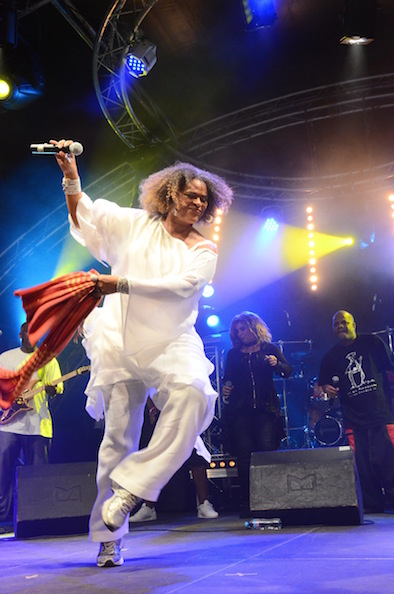 KARICULTURE.NET : In addition to singing, music and cinema, do you you other artistic passions which would deserve to be known to the public ? You practise photography, if I’m not mistaken…
KARICULTURE.NET : In addition to singing, music and cinema, do you you other artistic passions which would deserve to be known to the public ? You practise photography, if I’m not mistaken…
J. B. : Yes… I swapped my brushes for the lens. I always like painting and drawing and I must admit that I miss it very much. I hope I can do it again. Photography is a passion for me because I love nature and people. When I search for beauty, I escape and I am happy.
KARICULTURE.NET : What are your relationships (professional or personal…) with the Caribbean artists, in particular with the English-speaking and Spanish-speaking artists?
J. B. : We travel all the time and I do not have a lot of regular or sustained relationship with the Caribbean artists, apart from some Haitians we meet in the United States, Canada and, of course, in Haiti. Many of them are friends. I must admit that we are more fluent in English than in Spanish so the relationships are thus more superficial but very friendly with the Spanish-speaking artists. However, generally, I think that an artist who recognizes another one likes to talk with him. Edwin Yearwood from Krosfiyah, for example, composed a song in “Madousinay” my third solo album, he is from Barbados, an island where I often had the opportunity to stay. I had the opportunity to perform with a group from St Lucia, several years ago and I sang a duet with Michelle Henderson from Dominica. In Cuba, we met for a short moment some artists and Tata Guenes, a renowned percussionist, took part in my video for the song “Isi Ti tak”… It is very limited but always with happiness.
KARICULTURE.NET : The Caribbean created, among others things, many musical rhythms (bèlè, gwoka, rasin, gombay, biguine, compas, cadence, calypso, soca, zouk, salsa, reggae, merengue, dance hall, reggaeton etc.), literary movements (negritude, “creolity”…) known throughout the world, it excels in pictorial art (Haitian painting called naive painting…), what can we do to make more conscious and pround Caribbean people of their contribution to the culture of mankind ?
J. B. : First, we must stop saying that the Haitian painting is “naïve”. That infantilizes it! It is a very European expression and we must start by seeing ourselves with our eyes and admit that what we have is stronger without the other one saying it, first. I think this can only be done by repairing our brains which are still dominated or controlled…
KARICULTURE.NET : Many young women became singers with you as a model, what can you say to all those who, today, have this dream?
J. B. : It is a beautiful dream but they have to hang on. If they try to appeal to everyone at all costs, they will get lost in compromises. Originality rewards. The pleasure of sharing with two or twenty thousand people, is the same. Music does not always allow a conventional life. You learn something new every day and from everybody. No one give you anything, it is the work that allows to grow.

